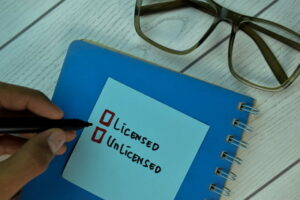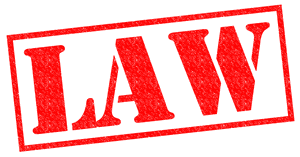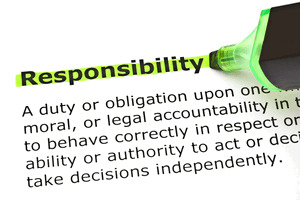 When online gamblers access a site to enjoy gaming or betting opportunities, it is most likely that they are not really thinking about whether it possesses an official licence or not. Instead, the available games and promotional offers stand out way too much to consider this.
When online gamblers access a site to enjoy gaming or betting opportunities, it is most likely that they are not really thinking about whether it possesses an official licence or not. Instead, the available games and promotional offers stand out way too much to consider this.
However, it is actually quite important to understand whether a licence is held by such sites, as they can differ in how they operate and in how they keep you and your money safe in the process.
What exactly can happen if you choose to gamble at a site that does not hold an official licence? And how does this affect you in the long run? Is it really so bad to choose to bet or play games at unlicensed bookmakers or casinos?
Well, that is what we are here to look into today – the outcomes of what can potentially happen when you sign up to and play at an unlicensed gambling site. You never know – perhaps it will make you think twice about registering for an account and depositing at one!
Why Are Gambling Companies Required to Hold Licences?
 In the United Kingdom (and in multiple other countries around the world), it is illegal to operate a gambling site that caters to residents of the country unless you hold a license. Gambling law in the UK actually provides some of the most stringent legislation and protections around the globe, and this is only set to become harsher if indications towards the restructuring of the Gambling Act 2005 have anything to do with it.
In the United Kingdom (and in multiple other countries around the world), it is illegal to operate a gambling site that caters to residents of the country unless you hold a license. Gambling law in the UK actually provides some of the most stringent legislation and protections around the globe, and this is only set to become harsher if indications towards the restructuring of the Gambling Act 2005 have anything to do with it.
The available gambling licences are in place so as to not only protect you, the punter, from those unlicensed platforms which could operate scam sites, but also to protect the platforms themselves,. Gambling in the UK is considered legal and it is possible for companies to set up gambling platforms as long as they possess an official licence from the Gambling Commission. As it happens, the introduction of the aforementioned Gambling Act is what started to officially regulate the country’s gambling scene. Prior to this, it operated as a largely unregulated industry online.
In order for companies to be able to apply for and get hold of a UK gambling licence, they are required to demonstrate that they have various protections in place. These should make the customer feel secure at the site they are joining, whilst also preventing crime taking place by checking the source of funds, verifying users and making sure players are over 18 years of age, checking for signs of problem gambling, having appropriate complaints systems and independent mediation if necessary and protecting your deposits in case the company goes bust. It is through the UK Gambling Commission website that you can confirm whether or not an online casino possesses an official licence.
Unfortunately, there are still sites which choose to operate without an official UK gambling licence in their possession. How are they able to do this successfully, thereby providing UK gamblers with illegal platforms to sign up to and gamble at? Well, the fact is that many of the illegal sites are based outside of the country. These offshore platforms either hold a gambling licence from a less-than reputable organisation, or no licence at all. Therefore, because they exist outside of the UK’s borders, the Gambling Commission has no capability of shutting them down directly.
A recent report suggested that offshore gambling companies should be forced into basing themselves out of the UK (and therefore owning an official gambling licence as well). This move would stop the country from losing “hundreds of millions in tax” to the offshore platforms. Within that same report, it was found that more than half of the remote gambling services utilised by players within the UK are firms located in Gibraltar instead. However, these sites do also possess proper UK gambling licences – it is just their base of operations that exist outside of the country due to tax purposes.
What Sort of Issues Can Arise With Unlicensed Sites?
 Why is it bad if you choose to access and join an offshore casino site? What negative experience could you have?
Why is it bad if you choose to access and join an offshore casino site? What negative experience could you have?
Well, some people have questioned whether or not they can be punished for being found to have registered and played at such a site. The answer to this is most likely no, unless you are using those sites for criminal means or with criminal money.
Technically the onus is on the customer to check they are betting with a licensed operator (license details are usually displayed on the footer of the operator website) as this is the only way you can legally bet. In reality it is unlikely any action would be taken against the player in question, the real risk is to the player themselves and their money.
Because of the fact that the Gambling Commission does not have any real control over these sites and they are often based in locations where they cannot be legally touched, it is hard for the UKGC to shut down these unscrupulous sites. There are calls for the UKGC to have more power in this area under new rules due to come in, although it will never be perfect and there will always be a black market for gambling. The main point is you are at much higher risk of being taken advantage of by an unlicensed site and if you are you have little legal recourse after the fact.
Sites that have taken the legal route and sought out a gambling licence from the UK Gambling Commission have to adhere to certain rules and regulations because of it. The licence stops them from committing criminal activity, and also ensures that they provide safe platforms for gamblers to join and deposit at. Without this licence, an online casino or bookmaker can pretty much go about its business as it chooses. it is not restricted by any laws and regulations.
Within the rules surrounding these sites with official licences, there is the necessity of utilising an arbitration service, whereby if a customer and a platform have disagreements, there is a certain recourse that can be taken. In this instance, if you are playing at a site and you believe it has done something unjust or scam-like, you can take the arbitration route to correct this. Without such a licence, you are essentially left without assistance in this area. And there is even more negativity that you can experience, too.
Losing Money to the Bookie / Casino
 Because an online betting site without a licence can operate in any which way it likes, you could proceed with making a deposit only to find that your money goes missing. You are the one who has opted to transfer that money into an unlicensed site, and essentially, the likelihood is that the operator has seen the money and chosen to keep it for themselves. This is not something that you would any recourse for, thanks to the fact that the platform has chosen to offer its services to you illegally.
Because an online betting site without a licence can operate in any which way it likes, you could proceed with making a deposit only to find that your money goes missing. You are the one who has opted to transfer that money into an unlicensed site, and essentially, the likelihood is that the operator has seen the money and chosen to keep it for themselves. This is not something that you would any recourse for, thanks to the fact that the platform has chosen to offer its services to you illegally.
Unless you have utilised a card to make your deposit in the first place, in which case you can usually submit a chargeback request, then it is likely that you will never see that money again. Illegal online gambling sites are not restricted by rules and regulations like genuine platforms are, so they can simply take the money and make off with it.
Many illegitimate sites may look like they are operating perfectly. You have deposited, you have played games and you have won a good amount. However, when it comes to the time for you to make a withdrawal, these sites frequently tend to stall the transaction, hold the funds back and often don’t even process it through at all. Again, this is all down to the casino operator being unlicensed and capable of taking forever and a day to process such a transaction. It has no regulations to adhere to regarding a timeframe in which a payout should be completed, so it could hold that money back for weeks and months.
It is common for unlicensed sites to provide ridiculous offers, 5000% bonus up to £1000 for example. They do this because they have no real intention of paying you out if you do win.
Responsible Gambling Protection
 In the United Kingdom, all legal and licensed online gambling sites should provide details and information on how to get help if you are experiencing problem gambling symptoms. They are also obliged to monitor the source of funds and customer behaviour to spot signs of harm as well as ensuring customers are verified for their age and residency. This responsible gambling process allows you to seek out assistance and provides all the information necessary to do this. That includes links to various responsible gambling organisations, including GamCare, GambleAware and so on.
In the United Kingdom, all legal and licensed online gambling sites should provide details and information on how to get help if you are experiencing problem gambling symptoms. They are also obliged to monitor the source of funds and customer behaviour to spot signs of harm as well as ensuring customers are verified for their age and residency. This responsible gambling process allows you to seek out assistance and provides all the information necessary to do this. That includes links to various responsible gambling organisations, including GamCare, GambleAware and so on.
However, if a site is unlicensed, it is not required to display this information or perform any check, and in most cases, they won’t. If you find yourself depositing more and more money, wanting to gamble more often, getting annoyed when you lose and showing other signs of gambling addiction, there is not really a route for you to take at such platforms. You are essentially left to your own devices. And while it is true that there have been instances of legal gambling sites failing their customers in this area too, it is much more common when it comes to the unlicensed casinos.
Therefore, you could potentially sink into quite the spiral of gambling addiction by joining and playing at an unlicensed gambling site. You will realise when a site is legitimate by the page based on responsible gambling that they are required to display, as well as the links to the various charities and organisations supporting such.
Stolen Identity and Banking Details
 It is common knowledge among those people who play games at legal sites that when you are depositing funds, you need to enter banking details in many circumstances. At the same time, when you sign up for an account, you are required to enter your personal information to create that account. Protections are in place at legitimate gambling sites to stop others from getting their hands on this information and your banking details. Those same regulations are not in place at an unlicensed site.
It is common knowledge among those people who play games at legal sites that when you are depositing funds, you need to enter banking details in many circumstances. At the same time, when you sign up for an account, you are required to enter your personal information to create that account. Protections are in place at legitimate gambling sites to stop others from getting their hands on this information and your banking details. Those same regulations are not in place at an unlicensed site.
A story came about in 2012 of a man called Andrei Osipau, who made nearly £80,000 in casino winnings by utilising fake identities and fraudulent passports to open a multitude of online accounts. He committed bonus abuse by stealing other people’s identities and taking advantage of their bonus bets that were on offer. At Osipau’s home address, more than 5,900 scans of passports, utility bills and bank statements were found, relating to people from countries all around the world. It could have been that he got all this information from illegal offshore platforms, where security is nowhere near as tight as it is at licensed casinos.
A site that holds an official gambling licence from the Commission would have to ensure that it has the highest level of security in place. This protects a customer’s personal information that they enter to create their account, as well as documents that are uploaded to the casino/bookie to verify this information. At the same time, all deposit and withdrawal transactions should be sent in encrypted format, which is something that illegal offshore platforms are not specifically required to have. Instead, they provide a payment service and have little regard for how secure it is.
that is why it is such a risk to access any unlicensed site, not just relating to gambling, where money is being used. Hackers and fraudsters are at the peak of their own game, being able to get their hands on peoples’ information in a heartbeat and utilise it to their own advantage. The chance of this occurring at an unlicensed online casino is much higher than at a licensed site.
Even if the unlicensed site is relatively above board you will still not be protected if the company goes bust in the same way you would with a UK licensed site. In the UK customer money is ring fenced at the very least (basic protection) and with many operators there is insurance in place (medium protection) or money is held in completely independent accounts (high protection). This means if a licensed company does run into difficulties you at least stand a reasonable chance of getting your money back, with an unlicensed site there will likely be no protection at all.
Is Unlicensed Gambling A Big Problem?

Given everything mentioned already on this page then you might ask why anyone would gamble with an unlicensed site? A small proportion can be accounted for by players not realising they are gambling with an illegal brand, this is fairly easy given there are 1000’s of licensed brands and many unlicensed sites are set up to deliberately fool users into using them.
Most black market gambling is however done knowingly. The reasons why people would use an illegal site to bet vary a lot but typically it will be down to the following reasons:
- Unlicensed sites don’t pay tax so they can offer better odds / returns
- Illegal sites do not need to invest in verification procedures, monitoring or responsible gambling measures, again this can result in better advertised odds
- Their games are not regulated so can allow players access to titles not available in the UK
- The customer wants to gamble with criminal money or with money in an offshore account they cannot move to the UK
- Take advantage of bigger promotions and offers
- The customer has excluded themselves using responsible gambling systems in the UK and then turns to unlicensed sites
- The customer had been limited by most UK sites (e.g. for bonus abuse or consistent winning) and seeks illegal sites as a consequence
- The player has been approached, often through spam email, to sign up to an unlicensed site offering bigger rewards
You may be surprised to hear that black market gambling is estimated to make up anywhere between 1-4% of all gambling and is growing. That is £1-4 in £100 and for an industry worth over £16 billion (legally), a staggering amount of money. A report form PwC a few years back showed that illegal gambling represents 1.2% of total turnover.
Therefore illegal gambling is obviously still attractive to many people even in spite of the risks involved. It is part of the double edged sword of increased regulation, as the industry becomes more regulated and taxes increase then these costs are passed on to the users of legal sites meaning punters and players can find more value (or at least they think they can) with an unlicensed operator.
Where Do Unlicensed Casinos Usually Operate From?
 While there is little to stop unlicensed sites for being set up anywhere, there are certain locations that offshore platforms tend to set up shop more so than elsewhere. Curacao stands out as being one of the prime locations that operators have selected throughout the years. The reason being that it’s not difficult to acquire a Curacao eGaming licence, which makes a site look like it is trying to provide a legal service.
While there is little to stop unlicensed sites for being set up anywhere, there are certain locations that offshore platforms tend to set up shop more so than elsewhere. Curacao stands out as being one of the prime locations that operators have selected throughout the years. The reason being that it’s not difficult to acquire a Curacao eGaming licence, which makes a site look like it is trying to provide a legal service.
However, the rules and regulations that come as part of the Curacao gambling licences are so few and far between that it really does not make any difference. Most operators are not chased up to pay their licence fees, hand over tax revenue or adhere to any security protocol. They are pretty much offering an illegal service in the end.
However, pressure has been put on Curacao to amend its gambling sector, following a deal that was made with the Netherlands for financial support during the COVID-19 pandemic. As part of the State Package from the Dutch government, the Curacao authorities have been requested to set up a single regulatory body to control the sector. Additional licensing and sanctions for operators breaching rules would also be carried out by this body. This is to be completed by March 1, 2021. That could throw a spanner in the works of those sites holding Curacao eGaming licences and providing illegal services to the UK market.
Whatever the case may be, it is important for online gamblers to ensure that the platform they are joining is in possession of an official UK Gambling Commission licence. This way, you can be assured that the platform is providing a safe and secure service to players. Without such, you are at much higher risk of suffering at the hands of a moral-less operator, and while you won’t get into trouble with the law for this, you are likely to experience a less-than-favourable outcome with the casino.